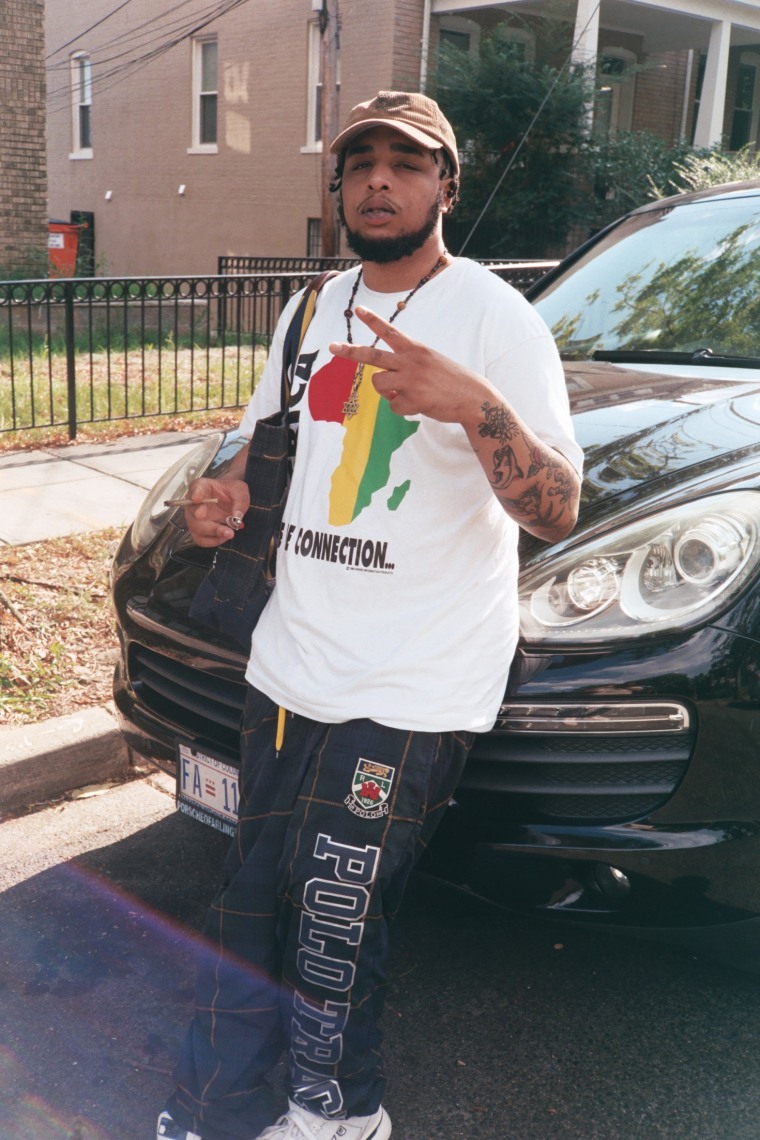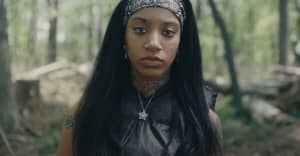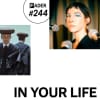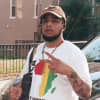
WifiGawd is entirely self-possessed. His work has a singular focus: finding the most interesting and innovative young producers working, teaming up, and creating cohesive full-length projects that push the sound of rap forward. Wifi approaches this task with the same reverent and solemn sincerity that may mark a Buddhist monk, a violinist in a symphony, a Shakespearean actor. He understands his job entails marathon studio sessions, "searching day and night" for the best producers, working outside of the mainstream, and a legion of biters, but for him the joy is found in the work.
The Uptown D.C. native’s approach to music and culture is informed by his upbringing. He was raised in the D.C. Rasta community, where the history and values of hip-hop’s first Golden Age were embedded deep into his being. While today's emerging artists often scoff at the four decade-long traditions of hip-hop, Wifi acknowledges his respect for KRS-One as quickly as his influence from Kid Cudi. In a time when “selling out” and “biting” are considered antiquated concepts, the music he makes is free of gimmicks and always his own, stamped with a dozen signature flows and a technically masterful delivery that rides the pocket of any beat.
Wifi came into his own in 2016 with two tapes that helped define two very different sounds from SoundCloud’s most creatively fruitful era. FUBU 05 took Plug beats to their logical conclusion: San Diego’s Cryjng crafted eleven complex and intricately constructed melodic soundscapes and Wifi found the perfect flow to compliment each one. WiFi Season, boasting production from Zaytoven as well as Working on Dying’s Ooogie Mane and F1LTHY, was a dark and gothic take on trap and tread music, dystopian street rap that would be playing in a Phillip Dick novel. In the ensuing three years, Wifi has released a dozen full length projects that are equally as cohesive and often as ambitious.
Some of his most interesting work has come as a result of him finding producers on the precipice of blowing up and collaborating with them for entire projects. In 2017 he released a full tape with Oogie Mane (who went on to work with Lil Uzi Vert, Playboi Carti, Drake, and more), Trenches to Riches, that captured the Philly producer’s range of sounds and ideas like nothing else before or since. The result was a project so good that Earl Sweatshirt told Wifi he listens to it every day. Where Trenches was bursting with energy, 2018’s Heat Check is where Wifi found chemistry with NYC’s Tony Seltzer, another nascent super producer, who has done records with Freddie Gibbs, Smokepurrp, and Ski Mask the Slump God. They made something completely unique here, a series of relaxed, downtempo portraits of Wifi eating expensive meals, smoking elegant dope and meditating on the quiet moments of his fire life.
This year, Wifi innovated yet another style of post-trap with ascendant young Tennessee producer Hi-C. On July’s Underworld Order he applied his formalist style of rap to Hi-C's unorthodox, intricate beats with booming kick drums and unexpected melodies. Wifi should be understood in the same way we understand artists like Tommy Wright and Z-Ro: an underground legend whose singular artistic vision transcends the scene and context from which he operates.
Today he’s is an integral part of both D.C.'s DIY scene and a larger DMV rap wave that promises to continue making a splash nationally. Beyond the appeal of his music, he has a magnetic charisma, elegant swag that is uniquely his own. His fashion sense and sense of self are more cultivated than most anyone I've met. On a recent phone call, the D.C. rap futurist discussed his music, his imitable fashion sense, and his deep roots in both D.C. and hip-hop's traditions.
So you were raised by Rastas, right?
I was born and raised in a Rasta community, yeah.
And I understand your parents sent you to a school where Pete Rock’s brother Grap Luva taught.
Yeah, Grap, that's like my uncle. He's one of the first people who really showed me hip-hop culture.
How did that shape your approach to music?
It was always promoted to be as creative as possible, to never be like the next man. That was always promoted growing up. So I guess in terms of music I just took that same aspect and incorporate it into songs. Just try to be myself 100%.
What type of hip-hop were you listening to growing up?
Really, like I told you I was in the Rasta community so my peoples wasn't really lettin' me listen to the radio like that. So the first rappers I was listening to was like KRS-One, De La Soul, Eric B. & Rakim, Big Daddy Kane, Slick Rick. Classic Rap. But the first song I ever heard on the radio was "Go D.J." by Lil Wayne. The moment I heard that shit I was like "Oh shit!" The beat, all that, that was a game changer. So I come from a lyrical background, but I kinda made my own style within it.

I know you're a huge Cudi fan, how did that kinda open it up for you?
That's my favorite rapper, bruh. I remember the DatPiff days, when DatPiff was really the spot, I heard that Kid From Cleveland mixtape and that shit fucked me up. I was like, Who the fuck is this nigga? Talkin' about Bape, 10.Deep, heavy! The hooks, the harmonies, all that shit. I was like I fuck with this nigga, bruh. He was talkin' about the shit that I fuck with, it sounds like he was talkin' to me.
When Earl brought you on stage it surprised a lot of people. But for me, 'cause of how skilled you are, your background, it totally made sense. How'd that come about?
He randomly followed me on Instagram one day. When I hit him up like "what's good?" he told me he listens to Trenches to Riches daily. Then when he was on tour and stopped by D.C. I got a chance to chop it up with bro. He mad cool, and he really fuck with the music.
When you really caught my attention was when you made FUBU 05 and WiFi Season within 6 months of each other. Did you mean to really flip it between different styles so much?
Yeah, I always wanted to touch every sound that I could. I would usually try to work with one producer on a certain sound, then we get the best from that sound and then I'm on to the next one, but still keeping that element in what I'm doing. Expect more… that's all it is, evolving.
Then you made that Oogie Mane tape.
Uh-huh.
That was crazy. Has anyone else done that on a tape with Oogie where they show all the sides of Oogie and all the sides of them?
I don't think so. Cause honestly in that tape it's different vibes throughout the whole shit and it's still hard. When we was making that tape I wanted to show the spectrum of both sides: he don't really just make one type of beat, y'know what I'm sayin? We really gonna go crazy on this shit.
That run was insane. Recently, on Return of Da Big Dawg, especially, I've noticed you're taking that whole futuristic wave and mixing it with your 90s influences.
Exactly. And that's what I feel like is evolution. If I was to speak to someone who already did that, like Redman, he would completely understand what I mean. Cause everything gets recycled.
Working with all these rare producers, do you think you kind of found that space? Where you're happy with the sound?
Nah, nah, see I ain’t ever gonna stop pushin’. I gotta keep fucking with the shit until I really find that level that I want. It’s close but it’s not where I want it to be.
What’s your studio process like now, trying to get to that level?
My studio process? Smoke a lot of weed, listen to the beats, pick the best one and just record my shit all myself, then link with one of my engineers and have ‘em mix it.
Jelani Kwesi.
Exactly.
I really like what he does with your vocals, how’d you find him?
I met him through one of my friends back home six, seven years ago. Eventually he came to a understanding of how I wanted my shit to be. It’s still all DIY. We not in no big studio, getting some extreme budget, it’s literally all us. Shit crazy bro, he’s the best engineer, crazy producer and artist himself as well. He did the “Dior Homme Selection” beat.
You have this knack for finding producers right before they blow up, what's your process for finding these guys?
It takes a lot for me to really gravitate towards a producer, cause I got so many beats in my email. I always check my email like it's the NBA Draft or some shit: you'll listen to a hundred beats and they'll all be trash except for one of 'em, and that one producer is probably that boy. You know what I'm sayin'? So that's usually how I find producers, or I'll hear a song that one of my friends made or some shit and be like, Bruh, who the fuck made this beat? I don't know, I just be finding 'em bro, searching day and night for hard ass producers.
Your visuals are crazy. Do you do all your own cover art?
Fuck, I wish bro. I did the art for Born From Hate. There will be a time when I do all my art, but right now I got a couple people who I like to work with. All the iconic cover art like FUBU 05, Wifi Season, Trenches to Riches was Stevie Franchise.

How important is D.C. to your creative process?
Extremely important. It influences the content a hundred percent. Without it, I wouldn’t talk about fashion, weed, and the way I talk about it. It gave me all the swag I got, y’know? I would say D.C. is one of the flyest places you could ever grow up. Just in terms of influence, the things you gonna be around. I’mma always have a home in D.C..
I guess we gotta talk fashion. What are some brands that you collect?
Brands that I collect? You know I got the FUBU, I collect Polo, Tommy, and then besides that designer sneakers, hats, certain accessories, pants, bro, I love pants.
You got a real unique fashion sense. Even back in 2016 you were rockin’ vintage shit, FUBU. Did you get that from D.C.?
Definitely I got the swag from D.C.. Growin’ up, if you wasn’t fly, you really wasn’t cuttin’ it. Who got the most Polo in they closet? Who got this, who got that. I’m like, Nigga, I got all that shit! But my peoples wasn’t get it for me I had to get that shit on my own.
You do a lot of shows, and everyone I talk to who’s been to one is like, “That was the best hip-hop show I’ve seen.” How’d you develop your live performance style?
I gotta shout out my brother Khan, if you know who that is. The Khan, he’s from D.C., really put on one of my first heavy shows where everybody wants to go crazy, you feel me? My friends like crushin the shit, so hard, bruh, I’m feeling the energy, bruh. Every time I hear my own shit I gotta go super hard.
Chris Richards, the Washington Post's music critic, really supports that DIY scene. How'd you react when you and the Khan ended up on the front page of the Post?
He comes to every show. And shit, I mean it was crazy, bruh. You grow up in D.C., you see the paper every day, and then the city gives recognition to what you're doin'. It makes you feel motivated to keep doin' it, you know what I'm sayin'? And it makes your peoples around you motivated, and your parents, they like, Damn you really doin' something.
That whole D.C. scene, the whole DMV scene is nuclear right now. You got you, Khan from D.C., Sybyr, Ghostie, all them from Baltimore, Kray from Virginia, Treez Lowkey, 909Memphis making crazy pop records. Plus you got that whole experimental scene with Gawd, Baby Sosa from Richmond even. Then Xanman, Q Da Fool who are kinda blowing up.
It’s literally crazy bro. It’s like a army. I always tell people we like Dungeon Family, Wu-Tang--- whatever iconic hip-hop group you wanna compare it to, we’re just like that. Except that the music industry hasn’t decided to shine the light properly. But it’s coming, everybody knows, now it's, Oh the DMV’s blowing up.



